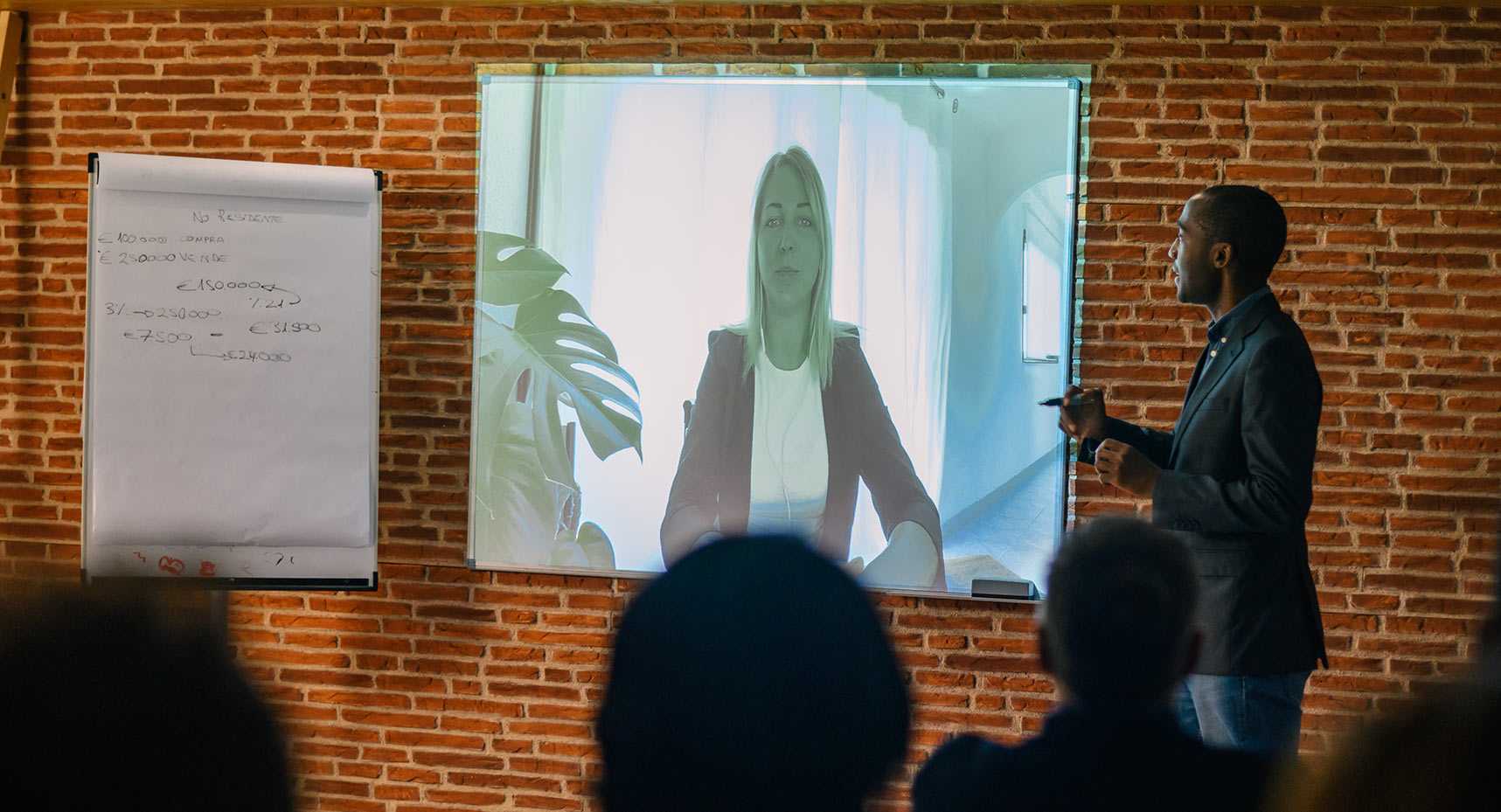Virtual corporate events have become essential for many companies over the past few years.
Whether it's internal conferences for employees (training), trade shows, or product launches, virtual experiences offer a host of benefits.
Let's take a closer look at this phenomenon.
What is a virtual corporate event?
A virtual corporate event refers to any event organized online (webcast, webinar) by a company to interact with its key stakeholders, whether employees, customers, investors, or any other group affiliated with the organization.
Unlike a traditional in-person event that takes place at a specific physical location, a virtual event allows participants to join from their computer or mobile device, regardless of their geographic location.
This eliminates distance barriers and logistical costs associated with transporting and accommodating participants.
While the COVID-19 pandemic accelerated the widespread adoption of virtual events, an increasing number of companies are considering maintaining this format even after the resumption of in-person activities.
Why organize virtual corporate events?

Multiple reasons motivate companies to opt for the virtual event strategy.
Here are some of them:
Significant Cost Reduction
This is the first incentive factor for many organizations. The savings from not having to pay for a reception hall, catering, travel and accommodation for participants are immense.
Unlimited Reach and Scalability
One of the great advantages of virtual event technology is that it allows hosting a virtually unlimited number of participants.
Whether you want to reach 100 or 100,000 people, all you need is the technological capacity to support such a virtual audience.
This also means that geographic reach is no longer an issue: participants from all corners of the province, country or even the planet can easily join.
Fortunately, our StudioCast webcast platform is at the cutting edge of technology and can support such an audience.
Discover how by booking a video meeting with one of our experts.
Improved Collaboration and Productivity
The integrated chat, interactive whiteboards, polling, and many other features allow participants to collaborate and interact much more effectively than at a traditional in-person event.
Moreover, by eliminating travel time, virtual corporate events significantly increase employee productivity.
A three-hour online meeting will allow everyone to return to work immediately rather than losing an entire day.
Superior Analytics Data
Since all participant activity is digitally captured on the online event platform, it is much easier for organizers to compile and analyze accurate data afterward.
The attendance rate, number of questions asked, social media engagement, etc.
All metrics that are difficult to quantify for in-person events.
The StudioCast webcast platform integrates business intelligence and allows you to perform real-time data analysis.
The information obtained enables you to continuously improve the participant experience and the ROI (return on investment) of virtual event activities.
The strategic advantages of virtual corporate events
In addition to the obvious operational and logistical advantages, virtualizing corporate event experiences offers many strategic advantages for businesses:
Expanded Accessibility
Regardless of participants' geographic or even physical limitations, absolutely anyone with an electronic device and an internet connection can participate in a virtual event.
This opens the door to audiences that would have been excluded from traditional events.
For example, a multinational company organizing an internal conference can easily allow its thousands of employees around the world to virtually attend certain key presentations and training sessions.
Simplified Collaboration
Since there is no need for each participant to block off several days and travel to a central meeting location, it becomes much easier to schedule collaborative work sessions between distributed teams.
Webcasting tools combined with virtual whiteboards and online project management software allow for much more frequent remote collaborative sessions of this kind.
Enhanced Participant Experience
While one might fear that a virtual event would be less engaging for participants, the opposite is usually true.
The multiple interactive features, polls and quizzes, live chat, and videos generally create a high level of participation.
Reduced Carbon Footprint

Recent environmental concerns are also prompting companies to look for ways to reduce travel and, as a result, their carbon footprint.
The calculations are clear: an annual event gathering 5,000 people for 3 days would normally generate no less than 2,600 metric tons of CO2.
By virtualizing it, this number is reduced to less than 10 tons, which is 99% less!
Source : lemonde.fr
What are the challenges of virtual events?

However, virtual corporate events do present some unique challenges for businesses.
Frequent Technology Barriers
Whether related to compatibility issues, internet connectivity, or insufficient digital skills, many participants will initially face technological difficulties.
This means it is essential to plan for comprehensive technical support before, during, and even after the event to ensure everyone can participate fully.
Better yet, work with an event agency that will take care of all the technical issues for you and your virtual event.
Cybersecurity Concerns
Another obstacle frequently cited by companies is the fear of having their data and communications compromised by hackers during a virtual event.
Fortunately, many security protocols can be implemented to prevent cyberattacks and protect any confidential information that could be shared during a corporate videoconference, for example.
Data encryption, two-factor user authentication, access rights limitation, and content filtering are some of the essential security measures to implement.
Major Technology Investments
To fully leverage the sophisticated features of virtual event platforms, major investments are often required in software, computer and audio-visual hardware, and network infrastructure.
According to the firm MarketsandMarkets, the global event technology market is expected to represent expenditures of $772.2 billion by 2028, with a considerable portion dedicated to digital innovations from recent years.
Difficulty in Fostering Engagement
Undoubtedly, it is more challenging to create a sense of community engagement and belonging to a group when everyone is behind their screen rather than gathered in the same room.
The trick, therefore, is to do everything possible to maximize interactivity, facilitate informal exchanges before, during, and after the virtual event, and rely on dynamic programming.
How to Plan a Successful Virtual Corporate Event
Now that we've explored what virtual corporate events are and their main issues, let's look at best practices for organizing one effectively:
Choose a Reliable and Flexible Event Platform
There are online event platforms specifically designed for all types of virtual corporate events, with a full suite of integrated tools:
- High-quality video conferencing
- Live video streaming
- Immersive destination pages
- Virtual meeting rooms
- Interactive whiteboards
- Chat and instant messaging
- Polls and quizzes
In addition to offering all the necessary features on a single platform, these all-in-one solutions greatly simplify the logistics.
Our StudioCast platform does all that! Ask us for a demo.
Did you know that business intelligence can "boost" your webcasts?
Découvrez comment dans notre article: "UNLEASH THE POWER OF BUSINESS INTELLIGENCE IN WEBCASTING SUCCESS"

Maximize Engagement with Dynamic Programming
The key to generating interest and active participation from virtual attendees is to vary the stimuli and formats:
- Short presentations: 10 minutes maximum
- Visual support: video, animation, product demos
- Interactivity: polls, quizzes, Q&A
- Collaboration: workshops in sub-groups with collaborative games
- Networking: informal sessions, round tables
- Entertainment: music breaks, humour, surprise guests
Alternating informative content segments with more casual exchange periods will keep all participants engaged.
Rigorous Logistics and Testing
With technology at the core of the virtual experience, thorough preparation is essential to prevent issues:
- Validate the platform's compatibility across all devices
- Ensure the system's capacity to support the number of simultaneous connections
- Test all tools and features
- Prepare tutorials and an FAQ for participants
- Provide the necessary technical support
By conducting full tests, most potential technical difficulties can be circumvented.
Analyze, Evaluate and Improve
The beauty of digital data is that it doesn't lie.
Here are the statistics to compile:
- Participation: attendance rate, average session duration, retention
- Engagement: questions asked, chat interactions
- Sentiment: satisfaction measured by survey, social media comments
- Conversion: leads generated, sales closed, applications received
This is just a glimpse of everything that can be precisely quantified after a virtual event.
Analyzing these metrics will continuously improve the effectiveness of virtual experiences.
With the right combination of proven technologies, interactive content, optimized logistics and rigorous evaluation, there is no doubt that virtual corporate events are the future for many companies.
The possibilities are endless in this burgeoning field!
Les innovations à surveiller

Although virtual events have already come a long way in terms of features over the past few years, technological advances continue at a frantic pace.
Here are some of the most promising innovations:
Virtual Reality (VR)
Immersive 3D environments that plunge participants into the heart of the action thanks to a VR headset. Ideal for product demos or ultra-realistic simulations.
Augmented Reality (AR)
The ability to superimpose 3D virtual objects onto the real environment through smart glasses or mobile devices.
Useful for providing interactive contextual information during a presentation, for example.
We can immediately think of the new Apple Vision Pro from Apple, which sells for the "modest" sum of USD 3,499 (and we're talking about the base model!)
Holographic Projection
3D projected images give the illusion that a presenter or object is physically floating in space in front of the audience.
Artificial Intelligence (AI)
Computer algorithms can personalize the virtual experience for each participant by recommending relevant content and key contacts. AI also allows real-time analysis of audience reactions.
According to a magazine found in BAnQ's digital library, Grand View Research estimates that AI will generate over $200 billion in revenue in the event industry by 2028.
And this is just a glimpse of the disruptive technologies poised to redefine virtual events in the coming years!
Conclusion - The Future is Virtual and Promising
Virtual corporate events are here to stay.
Combining substantial savings, unprecedented accessibility, superior analytical capabilities, and infinite innovation potential, they represent the future for many organizations.
With the right technology investments, a flexible platform, and an excellent content strategy, any company can benefit from this growing event model.
Although challenges remain, such as creating an authentic virtual sense of community, the advantages certainly outweigh them.
Be prepared to integrate a virtual component into all your events, and even to fully virtualize them.
Your participants, your budget, and the planet will thank you!
I hope this detailed article has allowed you to learn more about all aspects surrounding virtual corporate events.
Don't hesitate to contact us for more information.







